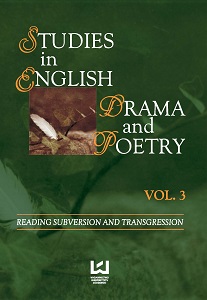Staging Transgression Stories in the Later Middle Ages: Divine Fiat, Truth and Justice in the N-Town Play of the Annunciation
Staging Transgression Stories in the Later Middle Ages: Divine Fiat, Truth and Justice in the N-Town Play of the Annunciation
Author(s): Estella Ciobanu
Subject(s): British Literature
Published by: Wydawnictwo Uniwersytetu Łódzkiego
Keywords: staging transgression stories;Later Middle Ages;Divine Fiat;Truth and Justice;N-Town Plays
Summary/Abstract: The Middle English Annunciation plays dramatise a heterological encounter whose stakes, Mary’s willing collaboration with God in the salvific project, can be brought to bear on both the Christian meta-narrative and the condition of women in late medieval Western society. Despite their edifying thrust, however, the Annunciation plays also stage transgression by referencing or intimating a breach of law, whose more overt forms range from recounting the story of Adam and Eve’s transgression of the divine commandment, coded in theological discourse as original sin, to the enactment of the Incarnation as transgression of natural law by divine fiat, an authorised transgression (Prosser) implicitly coded as transcendence and dramatised in the NTown Play 11 in a spectacular stage direction with a heavy dogmatic burden. I use the notions of truth regimes (Foucault) and truth formulae (Weir) to investigate the play’s less obvious unauthorised transgression (Prosser), manifest in the implicit interrogation of the Christian truth regime, i.e., the Lucan and Incarnational orthodoxy grounding the script, as it emerges from the divine debate on human redemption. Furthermore, reading the N-Town heavenly parliament with Anselm of Canterbury’s Cur Deus Homo points out the entanglements of kyriarchal truth regimes in power and the ensuing violence of representation (Armstrong and Tennenhouse). I argue that the play’s brief suggestion that the deity is overly revengeful appears itself transgressive of both contemporary theology and the secular ordo. This secondary discourse – a form of glossolalia (Certeau) – not only disrupts the naturalisation of human justice modelled on divine self-consistency but also intimates the self-legitimising drive of patriarchal discourses of worldly auctoritas.
Book: Studies in English Drama and Poetry vol. 3. Reading subversion and transgression
- Page Range: 15-30
- Page Count: 16
- Publication Year: 2013
- Language: English
- Content File-PDF

